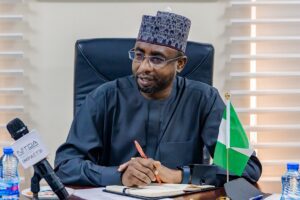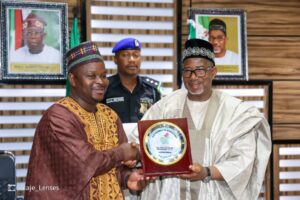
FG inaugurates committee to utilise technology for national identification
In a significant move towards technological advancement, the Federal Government has set up a new committee dedicated to addressing the use of technology for identifying Nigerian citizens, including underage children.
The initiative is spearheaded by the Minister of Communication, Innovation, and Digital Economy, Dr. Bosun Tijani who has outlined the Government’s ambitious plans to transform Nigeria into a technologically advanced nation, with a focus on harnessing the power of Artificial Intelligence (AI) across all sectors.
One noteworthy milestone in this journey is Nigeria’s signing of the Bletchley Declaration, which marks the world’s first agreement aimed at creating a shared understanding of the potential and threats presented by cutting-edge AI technology. It emphasises the need for international collaboration among governments to address the most serious concerns related to AI.
In a recent interview on ARISE NEWS, Minister Tijani highlighted the enthusiasm Nigerians should have for the introduction of AI, as Nigeria seeks to invest not just monetarily but also creatively in AI development. He stressed that governments worldwide are heavily investing in this sector due to its critical role in driving development. The involvement of government structures and the nurturing of creative talents within the nation are expected to boost national development.
Minister Tijani emphasised that the mainstream application of Artificial Intelligence is essential for solving the complex problems Nigeria faces. AI plays a pivotal role in data analysis, knowledge acquisition, and resource allocation.
It is a vital tool for addressing security concerns and optimising resource allocation in various sectors, including agriculture, public health, education, the film industry, and media.
To achieve these goals, the minister outlined the ministry’s five key pillars for the use of AI, which include building a strong workforce, reimagining policies to regulate and expand AI applications, improving infrastructure like broadband networks, increasing the pool of innovators and entrepreneurs, and exporting AI-enabled solutions to attract investors.
While concerns have been raised about the potential for AI to increase cybercrime rates, especially in the context of cybercrime in Nigeria, Minister Tijani stressed the positive aspects.
He highlighted the progress made in establishing proper identification systems through the National Identification Number (NIN) and the need to harmonize various identification databases, including the National Population Commission database, to better serve the population.
Addressing a pressing issue, he revealed the establishment of a new committee that includes critical ministries such as Interior Affairs and the Ministry of Communication, Innovation, and Digital Economy, to focus on the registration of newborns and children in primary schools. This move is essential to address the World Health Organization’s recent report indicating that about 43 percent of Nigerian children are not registered in the national system.
Tijani underscored the Ministry’s commitment to enhancing the quality and efficiency of public services through technology, thereby reducing costs and transforming Nigeria into a “tech nation.”
This strategic approach is set to position Nigeria as a leader in the application of AI and technology, shaping a promising future for the nation.



